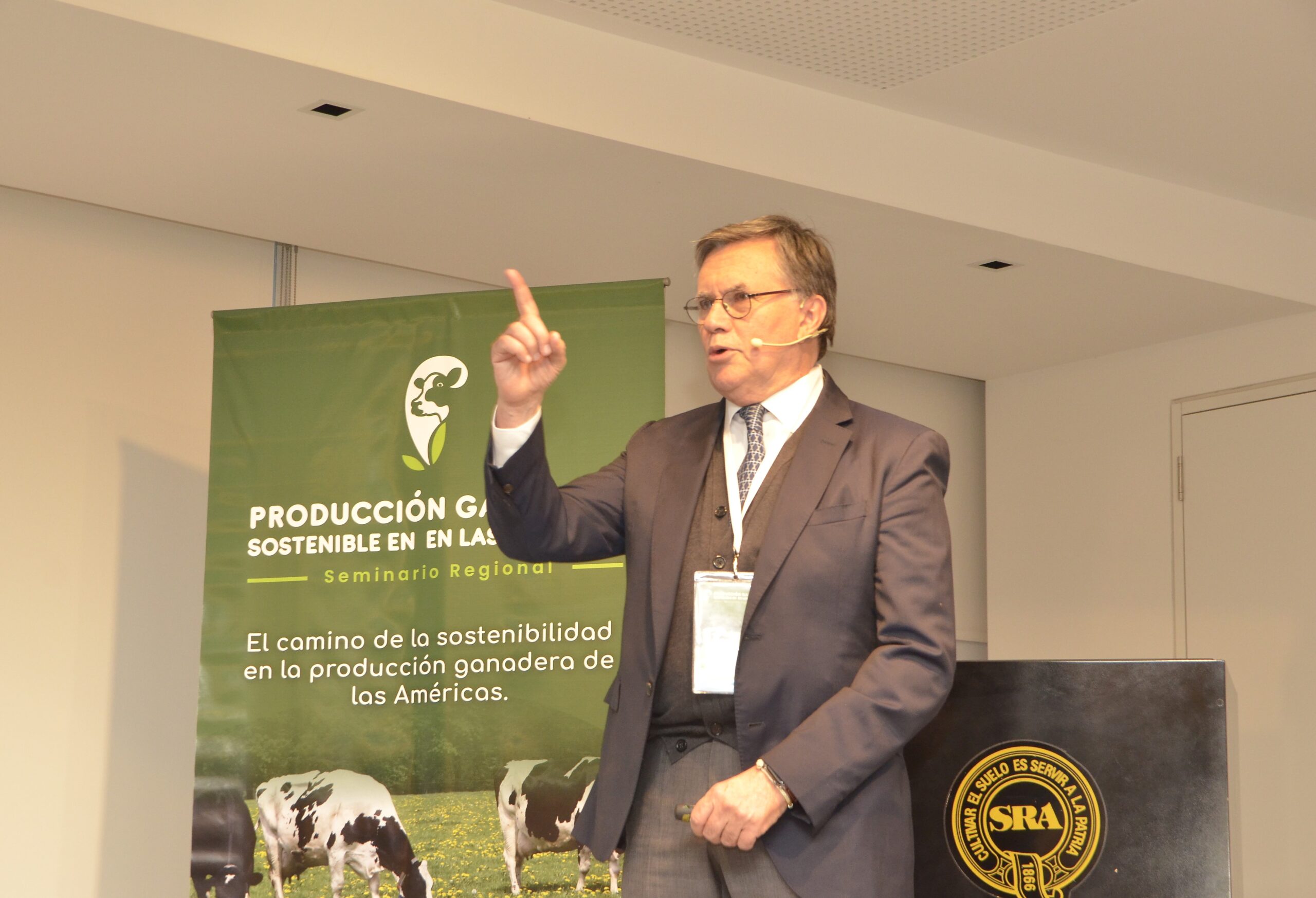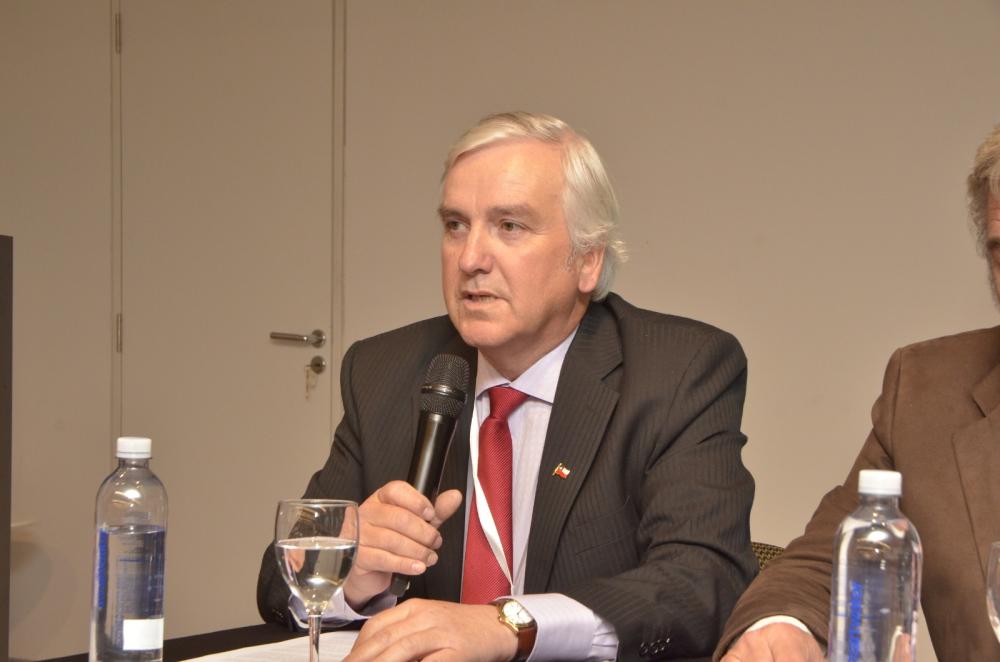The regional seminar “The Road to Sustainability in Livestock Farming in the Americas” provided an opportunity to present data, scientific evidence and information on the contribution of livestock farming. Specialists discussed ways to reduce environmental impacts and achieve sustainable and profitable production.

Buenos Aires, 20 April 2023 (IICA) – The livestock sector of the Americas must be present at all international environmental negotiations to demonstrate its progress towards greater sustainability, which has solidified its position as part of the solution to the climate crisis.
This was the consensus of specialists from the region who attended the regional seminar “The Road to Sustainability in Livestock Farming in the Americas” in Buenos Aires, Argentina. The debate was organized by the Federation of Rural Associations of the Mercosur Region (FARM) and the Pan-American Dairy Federation (FEPALE), together with the U.S. Dairy Export Council (USDEC) and the National Milk Producers Federation (NMPF). The Inter-American Institute for Cooperation on Agriculture (IICA) took part in the event, which was held in the auditorium of the Argentine Rural Society (SRA).
The event provided an opportunity to present data, scientific evidence and information on the contribution of livestock farming. In various panels, specialists discussed how to reduce environmental impacts and achieve sustainable and profitable production. They also demonstrated the ways in which the livestock sector and trade in livestock products contribute to building sustainable agrifood systems and food security.
The Director General of IICA, Manuel Otero, participated in a panel on the challenges facing Latin America and global livestock farming ahead of the upcoming United Nations Conference (COP 28), to be held later this year in Dubai. The other speakers were Jaime Castañeda, Executive Vice President of USDEC; Eduardo Schwerter, President of FEPALE; and Nick Gardner, USDEC Senior Vice President for Sustainability and Multilateral Affairs.
Castañeda emphasized the need to increase recognition of the livestock sector’s role as part of the solution to the global climate crisis. He also underscored the key economic and social role of the dairy sector in the United States and throughout the Americas.
According to USDEC data, in the United States there are 30,000 dairy farms, 94% of which are family farms, which serves to demonstrate the social importance of this activity.

Castañeda pointed out that livestock farming is vulnerable to climate change and that real data based on science and research should be used to challenge the perception that it contributes to the environmental crisis. In this regard, the U.S. dairy sector launched the “U.S. Dairy Net Zero Initiative”, which seeks to accelerate efforts to meet global environmental goals by 2050, through the use of new technologies and greater investment in research.
Furthermore, the U.S. dairy industry representative stated that there is a growing demand for animal protein in societies concerned about food and nutritional security. At the same time, the livestock sector is portrayed as a contributor to climate change.
“We must foster more sustainable agrifood systems, but with a focus on science and empirical evidence, avoiding ideological or philosophical approaches. We have been under direct attack, which is why we have gotten a bit defensive at times. The livestock sector, and the dairy sector in particular, makes a fundamental contribution not only in terms of food, but also in dynamizing the economy”, said Eduardo Schwerter, who chairs FEPALE on behalf of the National Federation of Milk Producers of Chile (FEDELECHE).
Schwerter explained that dairy chains in the region contribute to the economic development of territories and the progress of rural populations; take special care of the environment and sustainability; generate quality jobs and provide products with a unique and essential nutritional value for human beings.
The Chilean business leader also explained that livestock farming plays an important role in the new circular economy, given the fact that cows recycle grass, corn stalks, wheat straw and other by-products, largely composed of cellulose and lignin that cannot be used by humans, transforming them into food of great biological value.

The need to unite
Gardner gave an overview of current events in the U.S. dairy industry and described the ways in which it is advancing toward greater sustainability.
“We are deeply committed to sustainability”, said Gardner, “and that’s why we have adopted three commitments by 2050: to achieve net zero greenhouse gas emissions, optimize water use through recycling, and improve water quality through waste management”.
Gardner called on livestock farmers in the hemisphere to work together in the lead-up to environmental negotiations. “Many institutions have stated that livestock farming is the problem, and we must confront that narrative. It is likely that participants at COP 28 will be reluctant to talk about energy and will try to focus on food production instead, because our adversaries are well-organized and possess resources. That is why we must stand together”.
Otero pointed out that livestock farming accounts for half of the agricultural GDP of Latin America and the Caribbean and generates foreign exchange in the amount of 23 billion dollars with beef, and close to 3 billion with dairy products.
“Livestock farming in the region has made significant progress towards transforming sustainable livestock systems, with strategies to reduce impacts on water, soil and emissions, including technological development and the adoption of good practices. We must demonstrate this in the various international forums”, he said.
Otero considered that agriculture can no longer be absent from environmental negotiations. In this regard, he described the activities carried out at the Home of Sustainable Agriculture in the Americas pavilion set up by IICA at COP 27 in Egypt, and which will be set up again at COP 28.
“At IICA, we emphasize the fact that agriculture is part of the solution rather than the problem. Some sectors have tried to portray the agriculture sector in general, and livestock farming in particular, as the villain in the movie, which we will not accept. We are on the right track; we must simply persist in our efforts”, he concluded.
More information:
Institutional Communication Division.
comunicacion.institucional@iica.int











